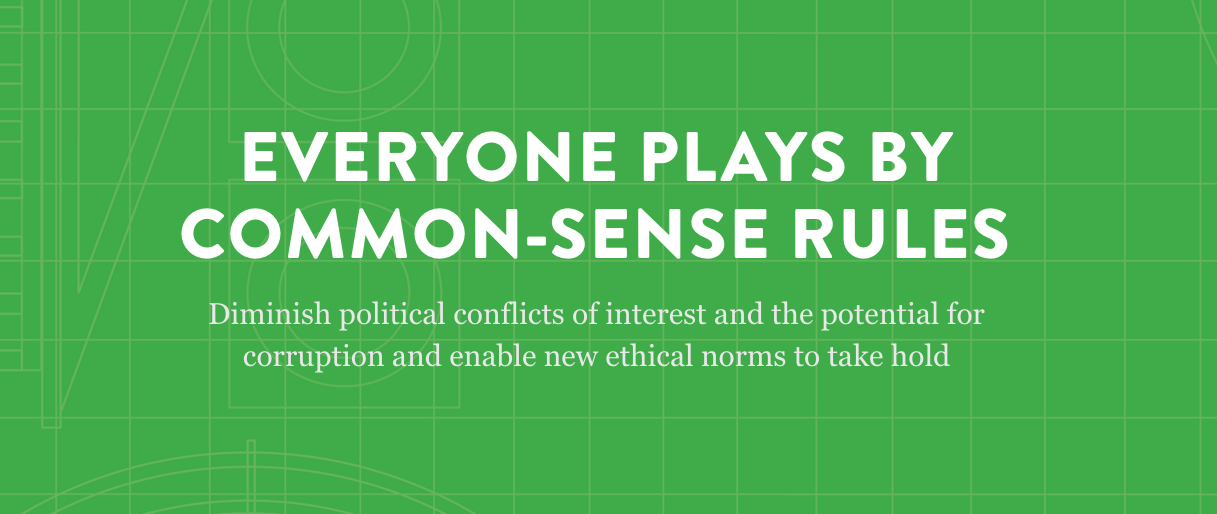Archived
Announcing Issue One’s Snapshots Project
Let’s face it: Not everyone can follow every money in politics, ethics or conflict of interest story, especially when there are daily — or hourly — developments. But we also…
Archived
This is the third installment of our blog series on Blueprints for Democracy, a new collection of solutions policymakers can implement to give everyone a greater say in their democracy. Read the full series here.
When you think of corruption, you might envision the classic “backroom deal.” Voluminous cigar smoke rises in a low-lit room. A shady character hands a briefcase full of cash or in-kind gifts, like front-row seats or airline tickets, to a crooked politician in exchange for a crucial vote.
In reality, ethics rules are often in put in place to preclude this sort of classic, quid-pro-quo corruption and other, more run-of-the-mill conflicts of interest. These laws take many different forms, from regulations on political contributions to bans on legislators accepting gifts from lobbyists or interest groups.
At the national level, companies that receive federal contracts are banned from donating to political campaigns. These “pay-to-play” restrictions are designed to preclude patronage and level the playing field so that the company making the best bid wins a given contract, rather than the company that donates the most money. As we’ve discussed in the past, federal courts have upheld these bans, but enforcement varies widely at the state level.
Donation restrictions often extend beyond contractors, though. In South Carolina, for example, registered lobbyists are banned from making or soliciting campaign contributions. In addition, the state has a “revolving door” ban that requires government officials and their immediate family members to wait at least a year after leaving office before they can register as a lobbyist.
In California, legislators cannot campaign using state equipment, staff time or office space. The state also imposes strict gift bans to stymie less-obvious means of influencing policymakers. In a given year, candidates or officeholders cannot accept goods or services worth $460 or more in aggregate from a single source, including travel reimbursement. Officials and candidates are also barred from accepting payment for speaking engagements, articles published or appearances made.
These restrictions can be controversial. Kentucky state Senator John Schickel and two Libertarians running for office are suing the state of Kentucky to contest campaign contribution limits and gift bans. Schickel alleges that the restrictions infringe upon his free speech rights and ability to stay competitive in his legislative race. And while Schickel’s argument largely runs contrary to the well-established principle of contribution limits, he is right to point out that independent groups have made it harder for candidates to compete. However, rather than attack ethics laws, states need stronger limits on independent group contributions, which are largely unregulated and can flood otherwise inexpensive elections.
Corruption comes in many forms, and is often much more insidious than a straight cash-for-vote swap. Ethics rules, contribution restrictions and gift bans are policy tools put in place to ensure that everyone involved in the political system plays by the same common-sense rules. These solutions are a critical component of the palette of policy reforms available to give all Americans a more powerful voice in their democracy.
In the next Blueprints for Democracy post, we’ll talk about enforcement agencies and analyze different government institutions that have been effective in regulating the campaign finance system, as well as how to reform the gridlocked Federal Election Commission.
Issue: Ethics &
Accountability
Archived
Let’s face it: Not everyone can follow every money in politics, ethics or conflict of interest story, especially when there are daily — or hourly — developments. But we also…
Archived
We’re excited to announce that we’ve just updated our groundbreaking Blueprints for Democracy report with the latest money-in-politics and lobbying reforms from across the U.S. During the 2016 elections voters…
Archived
Turns out that even if you’re no longer in office, you have to follow the rules and pay your bills. Which is a problem for former congressman and failed 2013…
 (blueprints for democracy common sense rules)
(blueprints for democracy common sense rules)
